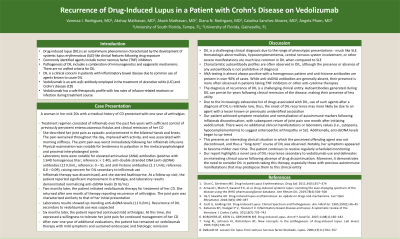Sunday Poster Session
Category: IBD
P0795 - Recurrence of Drug-Induced Lupus in a Patient with Crohn’s Disease on Vedolizumab
Sunday, October 22, 2023
3:30 PM - 7:00 PM PT
Location: Exhibit Hall

Has Audio

Vanessa I. Rodriguez, MD
University of South Florida
Tampa, FL
Presenting Author(s)
Vanessa I. Rodriguez, MD1, Akshay Mathavan, MD2, Akash Mathavan, MD2, Diana N. Rodriguez, MD2, Catalina Sanchez Alvarez, MD2, Angela Pham, MD2
1University of South Florida, Tampa, FL; 2University of Florida, Gainesville, FL
Introduction: Drug-induced lupus (DIL) is an autoimmune phenomenon characterized by the development of systemic lupus erythematosus (SLE)-like clinical features following drug exposure. This phenomenon is a clinical concern in patients with inflammatory bowel disease due to use of agents known to cause DIL. Vedolizumab is an antibody used in the treatment of ulcerative colitis (UC) and Crohn’s disease (CD). It has a safe therapeutic profile with low rates of infusion-related reactions or infection during treatment. We report a case of DIL recurrence secondary to vedolizumab use.
Case Description/Methods: A woman in her 20s with a history of CD presented with one year of arthralgias. She described her joint pain as episodic in the bilateral hands and knees. The joint pain was worst immediately following her infliximab infusions. Physical examination revealed tenderness of the metacarpophalangeal and proximal interphalangeal joints. Lab tests were notable for elevated antinuclear antibodies (positive with 1:640 homogenous titer; reference: < 1:40), anti-double stranded DNA (anti-dsDNA) antibodies (12 IU/mL; reference: 0 – 9), and anti-histone antibodies (2.1 Units; reference: 0.0 – 0.09), raising concern for DIL secondary to infliximab use. Infliximab was discontinued, and she started azathioprine. At a follow-up visit, she reported improvement in arthralgias, and laboratory results demonstrated normalizing anti-dsDNA levels (9 IU/mL).
Two months later, the patient initiated vedolizumab therapy. She returned after one month of therapy reporting recurrence of arthralgias. Lab results showed up-trending anti-dsDNA levels (11 IU/mL). Recurrence of DIL secondary to vedolizumab was suspected. She opted to continue vedolizumab and reassess her condition at a follow-up visit. After over one year of additional evaluations, she has remained on vedolizumab with mild symptoms and sustained endoscopic and histologic remission.
Discussion: This report highlights a novel case of DIL recurrence secondary to vedolizumab use and delineates an interesting clinical course following absence of drug discontinuation and thus a “long-term” course of DIL was observed. Our patient achieved symptom resolution and normalization of autoimmune markers following infliximab discontinuation, with return of joint pain after initiating vedolizumab. This demonstrates the need to consider DIL in patients taking this therapy, especially those with previous autoimmune manifestations that may predispose them to this clinical entity.
Disclosures:
Vanessa I. Rodriguez, MD1, Akshay Mathavan, MD2, Akash Mathavan, MD2, Diana N. Rodriguez, MD2, Catalina Sanchez Alvarez, MD2, Angela Pham, MD2. P0795 - Recurrence of Drug-Induced Lupus in a Patient with Crohn’s Disease on Vedolizumab, ACG 2023 Annual Scientific Meeting Abstracts. Vancouver, BC, Canada: American College of Gastroenterology.
1University of South Florida, Tampa, FL; 2University of Florida, Gainesville, FL
Introduction: Drug-induced lupus (DIL) is an autoimmune phenomenon characterized by the development of systemic lupus erythematosus (SLE)-like clinical features following drug exposure. This phenomenon is a clinical concern in patients with inflammatory bowel disease due to use of agents known to cause DIL. Vedolizumab is an antibody used in the treatment of ulcerative colitis (UC) and Crohn’s disease (CD). It has a safe therapeutic profile with low rates of infusion-related reactions or infection during treatment. We report a case of DIL recurrence secondary to vedolizumab use.
Case Description/Methods: A woman in her 20s with a history of CD presented with one year of arthralgias. She described her joint pain as episodic in the bilateral hands and knees. The joint pain was worst immediately following her infliximab infusions. Physical examination revealed tenderness of the metacarpophalangeal and proximal interphalangeal joints. Lab tests were notable for elevated antinuclear antibodies (positive with 1:640 homogenous titer; reference: < 1:40), anti-double stranded DNA (anti-dsDNA) antibodies (12 IU/mL; reference: 0 – 9), and anti-histone antibodies (2.1 Units; reference: 0.0 – 0.09), raising concern for DIL secondary to infliximab use. Infliximab was discontinued, and she started azathioprine. At a follow-up visit, she reported improvement in arthralgias, and laboratory results demonstrated normalizing anti-dsDNA levels (9 IU/mL).
Two months later, the patient initiated vedolizumab therapy. She returned after one month of therapy reporting recurrence of arthralgias. Lab results showed up-trending anti-dsDNA levels (11 IU/mL). Recurrence of DIL secondary to vedolizumab was suspected. She opted to continue vedolizumab and reassess her condition at a follow-up visit. After over one year of additional evaluations, she has remained on vedolizumab with mild symptoms and sustained endoscopic and histologic remission.
Discussion: This report highlights a novel case of DIL recurrence secondary to vedolizumab use and delineates an interesting clinical course following absence of drug discontinuation and thus a “long-term” course of DIL was observed. Our patient achieved symptom resolution and normalization of autoimmune markers following infliximab discontinuation, with return of joint pain after initiating vedolizumab. This demonstrates the need to consider DIL in patients taking this therapy, especially those with previous autoimmune manifestations that may predispose them to this clinical entity.
Disclosures:
Vanessa Rodriguez indicated no relevant financial relationships.
Akshay Mathavan indicated no relevant financial relationships.
Akash Mathavan indicated no relevant financial relationships.
Diana Rodriguez indicated no relevant financial relationships.
Catalina Sanchez Alvarez indicated no relevant financial relationships.
Angela Pham indicated no relevant financial relationships.
Vanessa I. Rodriguez, MD1, Akshay Mathavan, MD2, Akash Mathavan, MD2, Diana N. Rodriguez, MD2, Catalina Sanchez Alvarez, MD2, Angela Pham, MD2. P0795 - Recurrence of Drug-Induced Lupus in a Patient with Crohn’s Disease on Vedolizumab, ACG 2023 Annual Scientific Meeting Abstracts. Vancouver, BC, Canada: American College of Gastroenterology.
